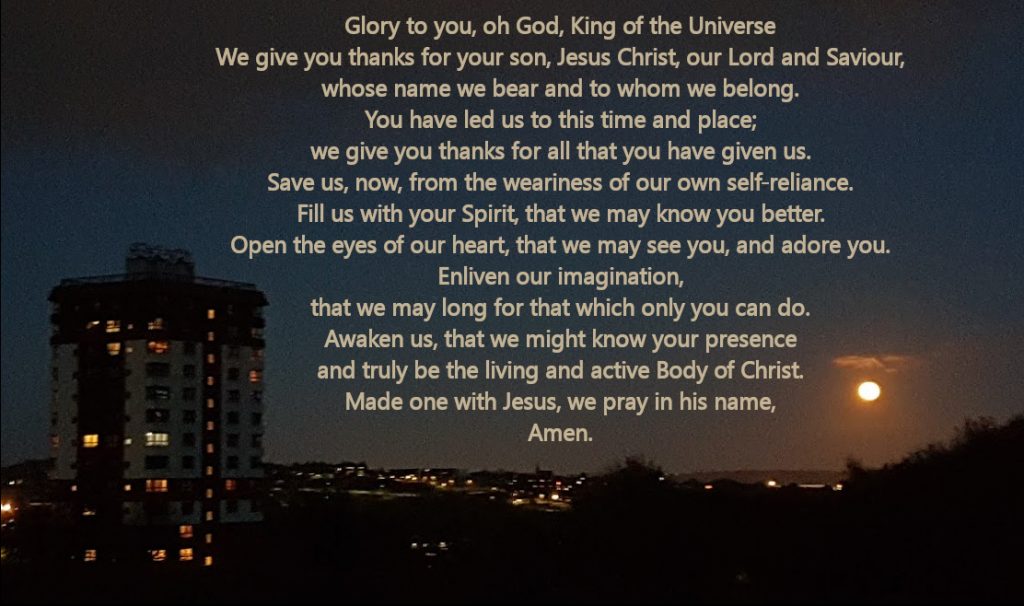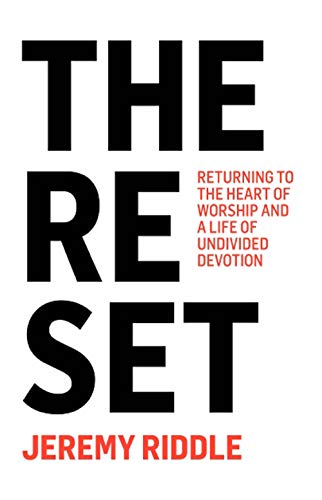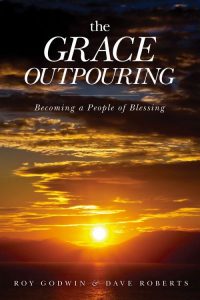 I remember a Bible college lecturer asking the class once, “What aspect of the gospel first impacted you?” For some it was about truth. For some it was about forgiveness and renewal. For others it was about belonging and reconciliation. The aim of the question was to get us to think about how the gospel is a passionate thing. How are we moved, enlivened, stimulated by the good news that Jesus, who calls us to himself, is King of this world?
I remember a Bible college lecturer asking the class once, “What aspect of the gospel first impacted you?” For some it was about truth. For some it was about forgiveness and renewal. For others it was about belonging and reconciliation. The aim of the question was to get us to think about how the gospel is a passionate thing. How are we moved, enlivened, stimulated by the good news that Jesus, who calls us to himself, is King of this world?
There’s a similar question about our sense of vocation, the part we play in God’s mission. How does the command to “Go and make disciples of all nations” move us? For some it is a passion to teach and preach. For others, it’s about embracing the broken with care and comfort. Some simply want to introduce people to Jesus. [Aside: there’s a strangely fivefold shape to these missional passions].
It’s a question worth pondering, because vocational fires dwindle. We come to plod from day to day, being as faithful as we can. Even church life can become a lurch from Sunday to Sunday; it can revolve around the management of buildings, and the placating of opinions. Individually, and together, we Christians are adept at curling up into ourselves and maintaining a static equilibrium of spiritual excuses.
Sometimes we even forget what those old fires felt like. But then annoying books like Pete Greig’s Dirty Glory come along and douse us in rocket-powering oxidiser.
I wasn’t really expecting to begin to burn again when I read Greig’s book. It was “just” another book; the standalone autobiographical sequel of “just” another hipster church leader and his well-marketed 24-7 prayer movement, (I mean, Bear Grylls wrote the foreword and everything!). I hadn’t really looked into 24-7 much (it’s mostly a UK-US thing and not as big in Australia). I’d heard enough to be both interested and slightly sceptical. And the thing is, I’ve read the book, and we’ve even visited Greig’s Emmaus Road church in Guildford, and I still don’t know much about the practicalities of the movement and the exact details of what they do. But there’s something at the heart of this book, something in the intermingled testimonies and teachings, that has caused my heart to be strangely warmed.
Here are the principles that I can glean from what Greig has written:
Dissatisfaction. I get this. Without a sense of discontent, mission is reduced to “more of what we already have.” Church health is reduced the static health of numbers and money, and not the dynamic growth of vision and depth.
I began to realise that it would now be possible to live the rest of my life as a minor entity on a Christian production line, busy and occasionally even applauded, peddling religious experiences without ever really nurturing the kind of inner garden that I admired in others, and which could make it all mean something in the end… It dawned on me, but only very slowly, that my inner turmoil could not be dismissed as a quarter-life crisis, it wasn’t boredom, nor could it be attributed to a besetting sin from the predictable checklist. Worryingly, nothing was wrong. Everything was right and yet I felt hollow. ‘Within me’, confessed St Augustine, ‘was a famine of that inward food: Thyself, my God.’ This hunger in my soul, I began to realise was not bad. In fact it was good: a gift of dissatisfaction directly from the Holy Spirit. (Pages 29-30)
For Greig, the touchstone of holy dissatisfaction is prayer. To express this he turns to the story of Jesus cleansing the temple, a house of prayer that had become filled with corrupt traders. He wants us to hear the rebuke of Jesus: “…[T]here could be large, impressive, popular churches… attracting large crowds… impressive buildings, strong brands, great wealth and a remarkable history…” but they might “evoke a similar rebuke” if “they have lost the fundamental heart of prayer”, (page 44). From this, he develops his “blueprint” of Presence, Prayer, Mission, Justice, and Joy (page 45) which becomes the essence and structure of the book.
Presence speaks of the fundamental imperative in prayer to “seek his face always” (page 51). I have been exploring these thoughts in different ways recently, and I was able to rest in Greig’s words here. What is fanned into flame is a posture of intimacy (page 71) and of surrender:
Urgent voices are calling us to abandon the familiar comforts of Christendom, to strike out into the unknown and rediscover the Nazarene. Let him hack our systems and take us back to the place of willing surrender in which we will simply do anything, go anywhere, say anything he tells us, whenever, wherever, whatever it takes… We need a theophany, a rediscovery of the terror of his proximity. (Page 57)
Learning to dwell (and even to sleep) in the love of the Father is offensive to the strategic part of our brains: a violation of the ego; a sort of dying. It can seem irresponsible… It can appear profiligate… It can seem naive and scandalous… It can appear selfish… It can seem rude… It can seem unstrategic… [but] ‘To be a witness’, says the writer Madeleine L’Engle, ‘is to be a living mystery. It means to live in such a way that one’s life would not make sense if God did not exist.’ (Page 77)
Prayer speaks of power. Greig recounts some amazing stories of answered prayer, of course, but this isn’t about hype. This is about simple prayers – bold, simple prayers – simply answered. It is also about “predictable valleys of the mundane” in between, in which “we mature; our faith fills up into faithfulness, we learn to push into community and into God’s presence, which is, after all, the greatest miracle of all” (page 108).
Luke 18:8 asks, “Will the Son of Man find faith, when he comes?” and Greig ponders “a big, fat, screaming ‘if’ hanging over the people of God in every generation: will we, will we not, pray when trouble comes?” (page 118). It is a real question. I used to think about ministry and church and simply assume that, of course, we would pray. After two decades in church ministry, I am no longer that naive.
Whenever prayer is reduced to a clumsy technique for getting God to mutter a reluctant ‘Amen’ to our selfish desires, it is merely wishful thinking in a religious disguise. But when prayer is an ‘Amen’ to God’s desires, it is profoundly Christian and powerful beyond measure. (page 126)
What is fanned into flame here is a connection of our worship with the renewal of the land. Greig draws on the promises to Solomon in 2 Chronicles 7:13-14 to do this, and takes us to “God’s great project to see creation remade” (page 120). He speaks of prayer as a travailing and wrestling (page 129), as childbirth (page 130), and even of violence (page 131); to not have that in church makes as much sense as a soldier not having a gun, “a boxer his fists, or a theologian great tracts of his Bible” (page 132).
I would pushback a little at Greig at this point, though, because he sometimes slips into a false progression: “Once the church is back to normal, pulsing with life, God’s great project is to see creation remade” (page 120). These are not distinct steps, as if once God has finished building the church, he’ll move on to the world! A church does not pulse to life unless it is already yearning for God’s great project. Christ grows his church as he calls us out into his world-changing purposes, not before he does. I think Greig gets this though.
Mission reflects how God intends us to be a house of prayer for the nations. Greig takes us to stories of God’s people being present – in America, Ibiza, and (later in the book) “Boy’s Town” on the Mexican border. These are missionary stories of the old kind, like the ones that stirred Gill and I in our YWAM days. They are of ordinary folk stepping out in faith, daring to go where others would not, for the sake of bringing light to a life, to a place, to a generation.
There’s some decent missiology in Greig’s approach:
“In approaching any new culture our first task is always to remove our shoes, recognising that we are standing on holy ground. We are not bringing the Lord somewhere new, because he is already here. Our primary task, therefore, is to identify God’s fingerprints and to trace his footprints in the new environment.” (Page 208).
And he helpfully addresses our propensity to perform mission as some form of service provision by professionals:
“Our own journeys of salvation and spiritual formation will… become intertwined with those to whom Christ is sending us… We go to the lost and make space for them to preach to us, to teach us, to minister to our unbelief. This requires stillness, and humility, a deeply anchored assurance in the gospel, and the ability to ask gently disruptive questions.” (Page 213)
Justice is the touchpoint at which mission impacts the real world. “Prayer without action is just religion in hiding”, (page 238). Justice is where mission gets real. Greig quotes Bob Pierce as he tells us that “one of the most dangerous prayers you can ever pray: ‘Let my heart be broken by the things that break the heart of God'” (page 247).
There’s a lengthy exposition of Kelly Teitsort’s ministry in Boy’s Town Mexico which fans these flames well. And Greig backs it up biblically: He runs a thread through the pre-exilic prophets (page 255), Christ’s cleansing of the temple, and his claim to fulfill Luke 4:18-19 (page 250) and then connects it to our own worship and mission. We are not just about reaching souls, we are about “recognising that “something [is] wrong systemically and it [is] only going to be changed by a profound cultural shift” (page 283).
“Compassion for the hungry, the stranger, the naked, the sick and the prisoner is not an optional extra for those with a strong social conscience. It bleeds from the heart of true Christian worship. When we care for the poor, we minister to Jesus himself.” (Page 254)
When God freed the Israelites from captivity in Egypt he did it literally – not just metaphorically. Similarly, when Jesus forgave the sins of the paralysed man… he proceeded to heal him physically too… Down the ages, it has always been the tendency of the rich to reduce salvation to a purely spiritual experience. But if you’re hungry you need real bread before you will consider the heavenly variety. If you’re in chains you take the Bible verses about freedom very literally indeed. (Pages 278-279, emphasis mine)
Joy is the outcome of faith as it works itself out through dissatisfaction. We are content with nothing else but the presence of God, manifest in power, mission, justice, etc. Jesus is our answer, and his presence is our joy, in with and through all circumstance. Greig spends much of this section talking about the fifteenth anniversary celebrations of his movement. He truly celebrates, but there is a warning away from triumphalism. He points us to the “Jesuit ‘Litany of humility’… From the desire of being praised, Deliver me, O Jesus…” (Page 315).
So why does all this make me burn up (in a good way)? I’m not entirely sure.
There are certainly some points of personal connection. I know what it is like to share the journey with a chronically-ill wife (“I’m sick of being sick”, page 116). I know what it’s like to travel internationally as a family, involving our children in the discernment and the cost (page 300). My tears flowed as Greig spoke of his wife’s graduation after “illness had robbed her of so many precious moments” (page 299). They flowed even more when I encountered the thought of “the Lord inviting us to pioneer together once again” (page 299).
I found myself repenting at points, or at least, crying out with a desire to repent. In our current season I know I have had to turn from the idolatry of comfort. I have had to repent of the faithlessness by which I have placed my sense of identity and worth, and the source of my family’s protection and care, not in God’s hands, but in broken ecclesial systems.
There was also times of frustration in my reading of this book. Having had my passions awakened, the engines are revved up and that is accompanied by a familiar sense of wheels spinning. No grip, nowhere to go. It’s time to turn this towards intimacy, towards trusting God not just for the fire, but the fireplace in which to burn, and the specific promises for a specific people to cling to.
For me then, the greatest help was Greig’s image of “Blue Camp 20.” This is drawn from his time in America where he learned the history of his local town: It was once a camp, a place where pioneers, originally intending to go on further, often decided to settle down instead. It speaks of premature comfort with a road not yet travelled.
I was moved by Greig’s confession of the temptation to “settle down here and stop pioneering… would it really be wrong to serve the Lord with a bit more cash, a bit more kudos, and a lot less rain?” (Page 141). Indeed, having experienced church planting, and time-limited placements, I am sometimes jealous of the seemingly comfortable run that some of my clerical colleagues get to enjoy! But then there’s that annoying, calling, stimulating and painful fire: “I signed up to change the world. I never wanted to be like it.” (Page 153).
It’s easy to pioneer when you’re too young to know what it will cost you, when you feel immortal and invincible and the whole of life is an adventure waiting to begin. But pioneering a second time is hard. Abraham was one of the few who never settled down – even in his old age he lived ‘like a stranger in a foreign country… For he was looking forward to the city with foundations, whose architect and build is God’ (Heb. 11:9-10). (Page 143)
We tend to assume that Blue Camp 20 is the frontier from which we can pioneer into new territory geographically, or into new effectiveness professionally, but ultimately it is the place of testing from which we can pioneer into deeper intimacy with Jesus than ever before. We wrestle with God at Blue Camp 20… to come close to him in greater intimacy. We lay down comfort at Blue Camp 20… We pioneer from Blue Camp 20 not to achieve something for God, but to receive something from him – a deeper fellowship with him in his death and resurrection (Phil. 3:10-11). (Pages 147-148)
Perhaps all that is happened in me is that Greig’s prayer for his book has been answered. It has deepened my thirst, because it has “rubbed salt on my lips” and woken me up, (page 12). It has had me shaking off the protections and pretenses of being a performing parson. It has had me reflecting on the past and the present. It has got me dreaming for the future. It has got me longing for his kingdom to come, real, substantial, local, global.
I no longer have the vigour and brashness of my youth and younger pioneering days. I know what real mission costs. I have regrets, and I have hopes. And all I can do is pray, to the glorious God who meets us in the dirt. Somehow, that’s where life happens, and I long for more of it.
I give you back today the prayers I have prayed that are not answered – yet. The seeds I’ve sown that haven’t borne a harvest – yet. The dreams I’ve buried that haven’t risen – yet. Restore the years, the prayers, the trust that the locusts have eaten. Remember me, Lord, redeem my life, and answer my oldest, truest, prayers. Amen.
(Page 307)
 Last week I was at a conference where the following words were used to describe our current circumstance:
Last week I was at a conference where the following words were used to describe our current circumstance:
 The deconstruction is real. The pandemic season is lingering and the waves of its wake are more disruptive, more disturbing, more confusing than the sudden crisis with which it struck.
The deconstruction is real. The pandemic season is lingering and the waves of its wake are more disruptive, more disturbing, more confusing than the sudden crisis with which it struck.




 This book comes from Welsh retreat centre
This book comes from Welsh retreat centre  After returning from our recent visit to Ffald-y-brenin, Gill and I have been pondering these things. What I have read of here, and what we have encountered has informed our dissatisfaction. It has renewed our passion for God’s Word and Spirit, and a determination to rely on him, rather than to burn-out in our own strength.
After returning from our recent visit to Ffald-y-brenin, Gill and I have been pondering these things. What I have read of here, and what we have encountered has informed our dissatisfaction. It has renewed our passion for God’s Word and Spirit, and a determination to rely on him, rather than to burn-out in our own strength. I have learned that the Scottish love Scotland. And the Welsh love Wales. But do the English love England?
I have learned that the Scottish love Scotland. And the Welsh love Wales. But do the English love England?
